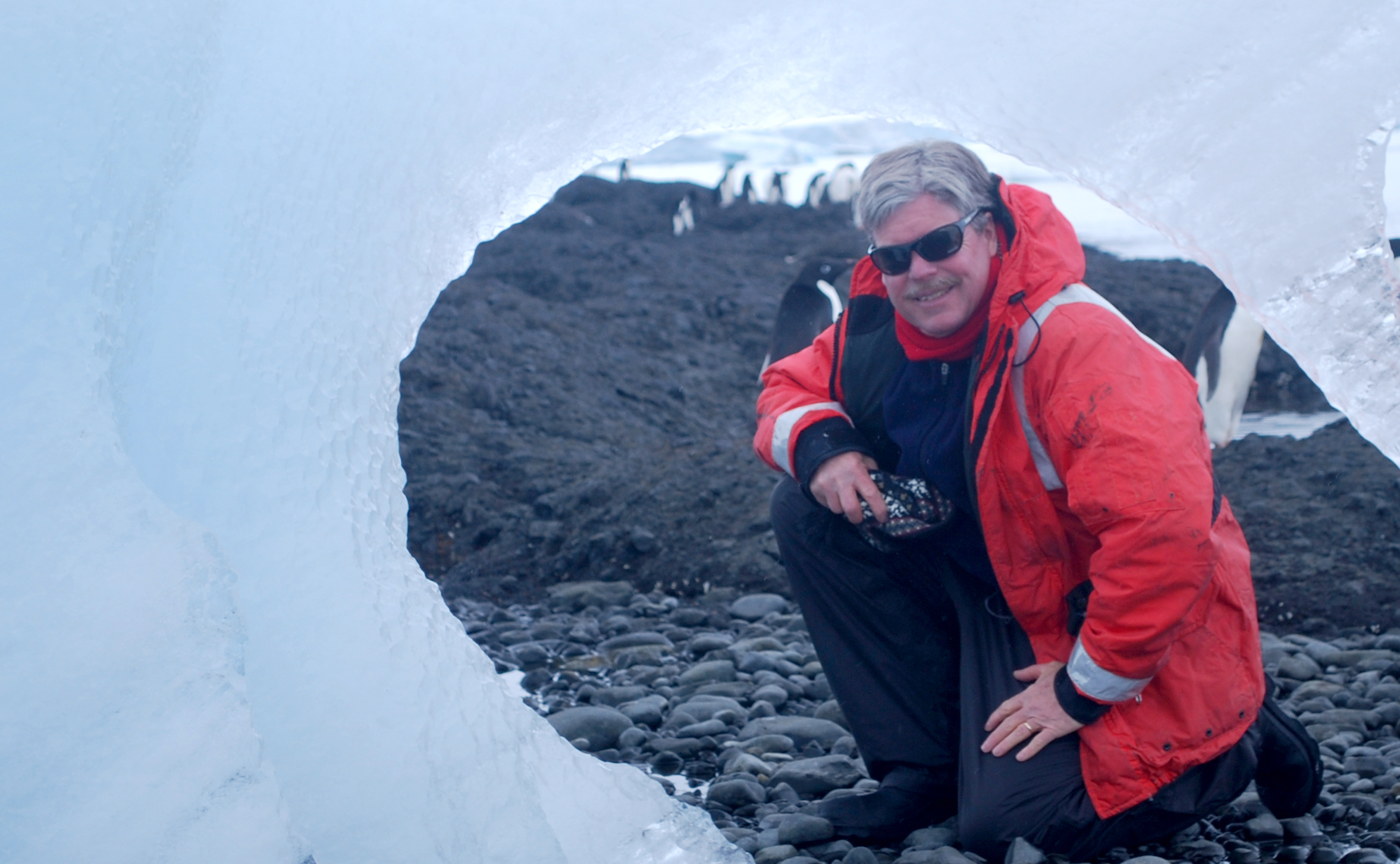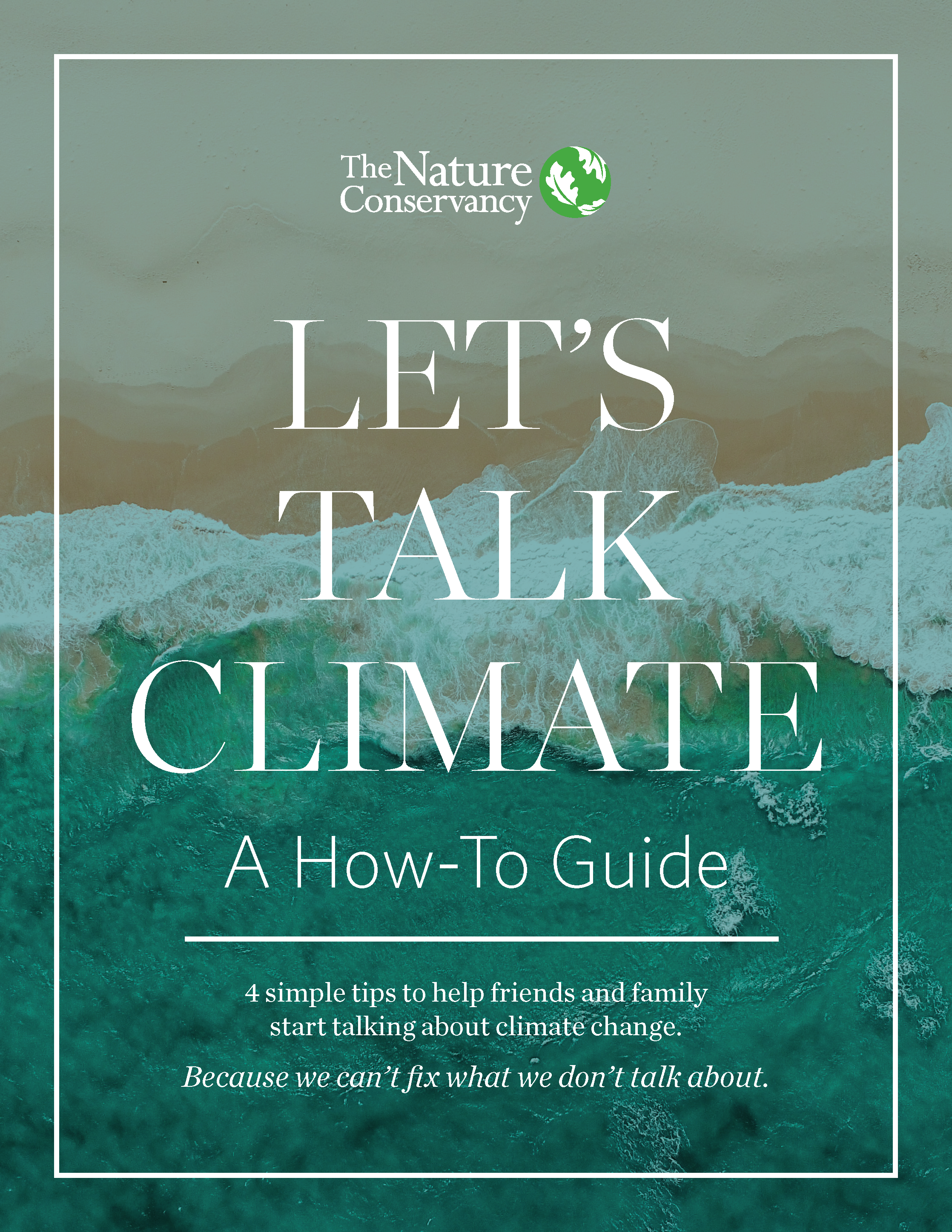A Connected Conversation About Climate Change
Advice on talking about climate change from those that talk about it every day.
The statistics are eye-opening. Even though roughly seven in ten Americans believe climate change is happening, and six in ten are at least “somewhat worried” about it, roughly 63 percent of Americans rarely if ever talk about climate change with the people they care about. And less than one in four Americans hear people they know having conversations about climate change once a month or more.
These facts have fostered a growing belief that one of the most important things an individual can do to promote climate action is taking the very simple step of talking about climate change with their friends and family. The Nature Conservancy’s Liz Georges recently sat down with climate scientist, author and TNC Chief Scientist Dr. Katharine Hayhoe, and award-winning Antarctic marine biologist Dr. James McClintock to find out what advice experts who talk about climate change every day might have for the rest of us as we try to talk to people in our lives.
Video: Can We Talk Climate?
Watch NowLiz Georges
Thank you both for speaking with me today. I want to focus on how to have a constructive conversation about climate change. The Nature Conservancy talks a lot in our Can We Talk Climate campaign about connected conversation. So what do you think are the elements of a connected conversation about climate change?
Quote: Katharine Hayhoe
The first key element is respect. If we do not respect the person we're talking to, they're going to pick up on that immediately.
Katharine Hayhoe
The first key element is respect. If we do not respect the person we're talking to, they're going to pick up on that immediately. And if they don't respect us back, then we're not going to be able to have a constructive conversation, either. So I think one of the most important things to discern is when a conversation is not going to be constructive, when it's time to just walk away from it and let somebody else have that conversation in the future.
The second key element, after respect, is finding a point of mutual agreement or understanding. If we don't know what that is, then we need to ask questions and listen to what they say: about their family or where they're from or what they care about or what they’re worried about. And if we still can't find something that we genuinely agree with them on, truly agree, and can connect with them on, then we're not the right person to have that conversation with them. There will be someone better in the future.
But if we can find something that we do agree on -- which in one memorable case, for me, actually turned out to be knitting -- then we can often start the conversation from that place where we can connect as fellow humans, and then connect the dots. With this one man, after I shared that the knitting he saw sticking out of my bag was a birthday present for my mom, he told me that the reason why he knits is because he likes to give handmade Christmas presents. “We're buying too much stuff and we're using too many resources,” he told me. “That’s true,” I responded, “if everybody on the planet had my lifestyle, it would actually take up four planets!”
And then he really got warmed up and explained how he didn't own a car, he only took one international flight a year, and he didn’t just recycle, he up-cycled which included building all his family's furniture out of old packing crates. After he was done explaining what his life looked like, I said to him (and I genuinely mean this), “I would rather everyone in the world lived like you, even if they rejected climate science, because we would not have the problem we do.” And he said, “Really?” I said, “Yes.”
Liz Georges
That's an interesting thing. We talk a lot about talking about the solutions, because the solutions are so amazing that sometimes you don't even need to get into the problem very deeply. The solutions have enough to recommend them on their own. Jim, what are some of your elements of a connected conversation?
Quote: Dr. James McClintock
Always remember that humans respond most effectively when there is hope for the future.

Jim McClintock
I agree with everything Katharine said. I think its identifying that ‘commonality.’ And once I identify common ground, I'm looking for an issue related to climate change that hits close to home. For example, I've got this uncle and he can't seem to get flood insurance for his beach house anymore. He’s asking, “What's going on? Coastal home Insurance didn’t used to be hard to find.”
Then you have an opportunity to say, “Well, why do you think that home insurance on our coast lines is becoming more expensive? Why are the big insurance companies raising their rates? Maybe it's related to the fact that global sea level is rising, and with warming oceans hurricanes are getting stronger and stronger.” This approach allows you to have a discussion without just launching in to a lecture about hurricanes getting stronger and you should move away from your home on the coast. Essentially, I find that if scientists or educators take a hard line, dogmatic approach to discussing climate change, they quickly lose their audience.
The other thing that I think is really important in this discussion is hope. We need to always remember that humans respond most effectively when there is hope for the future. If the discussion becomes too fatalistic, jump in and say, “Well, you know, there are some really good things happening.” I mean, who would have thought that I'd go on line the other day to catch up on local Alabama news and learn that a regional power company is building a 120-acre solar field that's going to power 20,000 suburban homes near Alabama’s capital city of Montgomery. There are good things happening related to addressing climate change, and scientists and educators, and elected officials need to remind people that private, public, and corporate renewable energy projects are increasing across America. Otherwise, people feel so buried in all the ‘bad’ news they feel helpless.
Katharine Hayhoe
I love that. So: respect, connection and hope. Those are the three ingredients of a successful conversation.
Liz Georges
For the person who is concerned and even alarmed, and maybe running out of hope, what's the one thing you think you could tell that person so that they could stay inspired?
Katharine Hayhoe
Hope is not a passive emotion. If we just sit here, it is not going to come find us. What will come find us is fear and despair, based on what we read and see and hear in the media every day: the bad news stories, the frustrating stories, the horrible stories, and more.
Hope is an active emotion. We have to go out and look for it. When we look for hope, as Jim said, we'll find it, because hope exists in what we are doing ourselves. By acting, we can actually give ourselves hope.
Hope exists when we plug into organizations of like-minded people, whether it's a school group at church group, a community group, an organization like The Nature Conservancy that has local chapters, the garden club, or Citizens Climate Lobby. If we connect with other people who are acting too, that gives us hope.
Looking at the encouraging and amazing advances in how we get our energy, how we do agriculture, what's happening in poor countries to help them develop in new and better ways, that gives me hope too. And looking at what our kids are doing; there are some amazing kids in this world that are leading with their voices and their examples. How can you not look at what they're doing and not feel hopeful?
Liz Georges
How about you, Jim? What do you think keeps people going or helps them stay inspired?
Jim McClintock
I think it's all about ‘engagement,’ just like Katharine said. If we can encourage people to get engaged in a climate issue, and so in concert with finding a group of proactive individuals that share common ground, there's nothing more powerful . And there's so many opportunities to do so. So, I’d say get engaged, make a difference, and you'll feel great and by doing so you'll give yourself and others hope.
Be Part of the Solution
We can't solve a problem we don't talk about. And we want to make talking about climate change easier.
After you take our climate change pledge, we'll send you an e-book with four simple tips on having a connected conversation. We'll also keep you informed and invite you to local events where you can learn about real, systemic solutions that are good for our communities, our economy and our planet.



